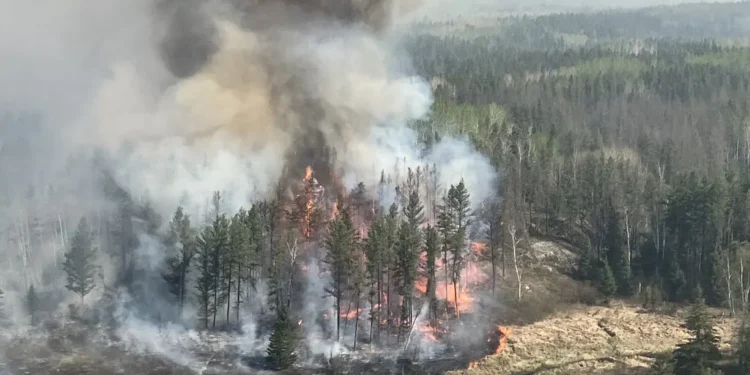By WorldNow | May 30, 2025
Record-Breaking Wildfires Grip Canada
Canada is facing one of its most devastating wildfire seasons in recent history. As of late May 2025, over 1,377 wildfires have scorched the nation, burning more than 1.58 million acres of forest land. The provinces of Manitoba and Saskatchewan are among the hardest hit, with the situation forcing widespread evacuations and state-of-emergency declarations.
In Manitoba, over 22 wildfires remain active, with nearly 200,000 hectares already consumed by flames—triple the province’s annual average. Key fires, such as the Bird River Fire and the Border Fire, continue to burn uncontrollably due to prolonged dry conditions, gusty winds, and record-breaking temperatures.
Mass Evacuations Amid Growing Danger
As fires crept perilously close to populated areas, the town of Flin Flon, with approximately 5,000 residents, was evacuated under emergency orders. Citizens were instructed to flee via Highway 10, as flames approached city limits. Temporary shelters have been set up across Manitoba and neighboring provinces for the displaced.
Both Manitoba and Saskatchewan have declared provincial states of emergency to mobilize additional firefighting and disaster relief resources, including help from federal teams and volunteer units.
Smoke Plumes Spread Across the Continent
One of the most alarming consequences of this wildfire crisis has been the emergence of massive smoke plumes, now visible from space. These plumes have traveled southward into the United States, significantly degrading air quality across the Midwest and beyond.
U.S. states Minnesota, Wisconsin, Illinois, Michigan, Indiana, and Ohio are experiencing hazardous air conditions, with Air Quality Index (AQI) levels reaching “orange” (unhealthy for sensitive groups) and even “red” (unhealthy for everyone) in some cities.
- Cities like Duluth, Green Bay, Madison, Milwaukee, and Grand Marais are under active air quality alerts.
- Chicago, Detroit, St. Louis, and even parts of the East Coast could see worsening air by the weekend, according to meteorologists.
Health Risks and Scientific Concerns
Wildfire smoke is more toxic than urban smog, containing a dangerous mix of pollutants, including fine particulate matter (PM2.5) and polycyclic aromatic hydrocarbons (PAHs). Scientists warn that even short-term exposure can exacerbate respiratory and cardiovascular illnesses.
Health authorities urge:
- Staying indoors with windows shut,
- Using HEPA air purifiers,
- Wearing N95 masks outdoors,
- Avoiding strenuous outdoor activity.
There is no known safe level of wildfire smoke exposure, especially for vulnerable populations like children, the elderly, and those with chronic health conditions.
Smoke Crosses the Atlantic
Remarkably, satellite data confirms that smoke from these fires has traveled across the Atlantic Ocean, reaching Ireland, the UK, France, and parts of Scandinavia. The Copernicus Atmosphere Monitoring Service reported elevated aerosol optical depth levels, indicating significant air pollution over parts of Europe.
In affected European regions, hazy skies and red-hued sunsets are being reported—clear signs of smoke-induced atmospheric changes.
No Relief in Sight
With dry conditions persisting and temperatures climbing, the wildfire threat in Canada is expected to worsen. Experts predict a long and destructive fire season for Western Canada throughout the summer.
Canadian authorities are urging all citizens in wildfire-prone areas to:
- Prepare evacuation kits,
- Stay updated through official alerts, and
- Follow emergency instructions without delay.
Final Word
Canada’s escalating wildfire crisis is no longer a localized emergency—it’s a continental and even global concern, impacting public health, environmental safety, and cross-border cooperation.
As fires rage and skies darken with smoke, coordinated efforts among government agencies, scientists, and civilians are crucial to minimizing further damage.
For the latest updates, air quality reports, and safety advisories, visit:
Photos and satellite imagery courtesy: NASA MODIS.




































